I was invited to talk about my findings from this post on Food Unwrapped on Channel 4 on Monday 9th March 2020. If you’d like to watch the episode you can VIEW IT HERE.
One question I get asked quite regularly is whether medium eggs can be substituted for large in a recipe or vice versa. So I took to the kitchen and started experimenting to test the difference egg size makes and to answer some other egg-related baking questions.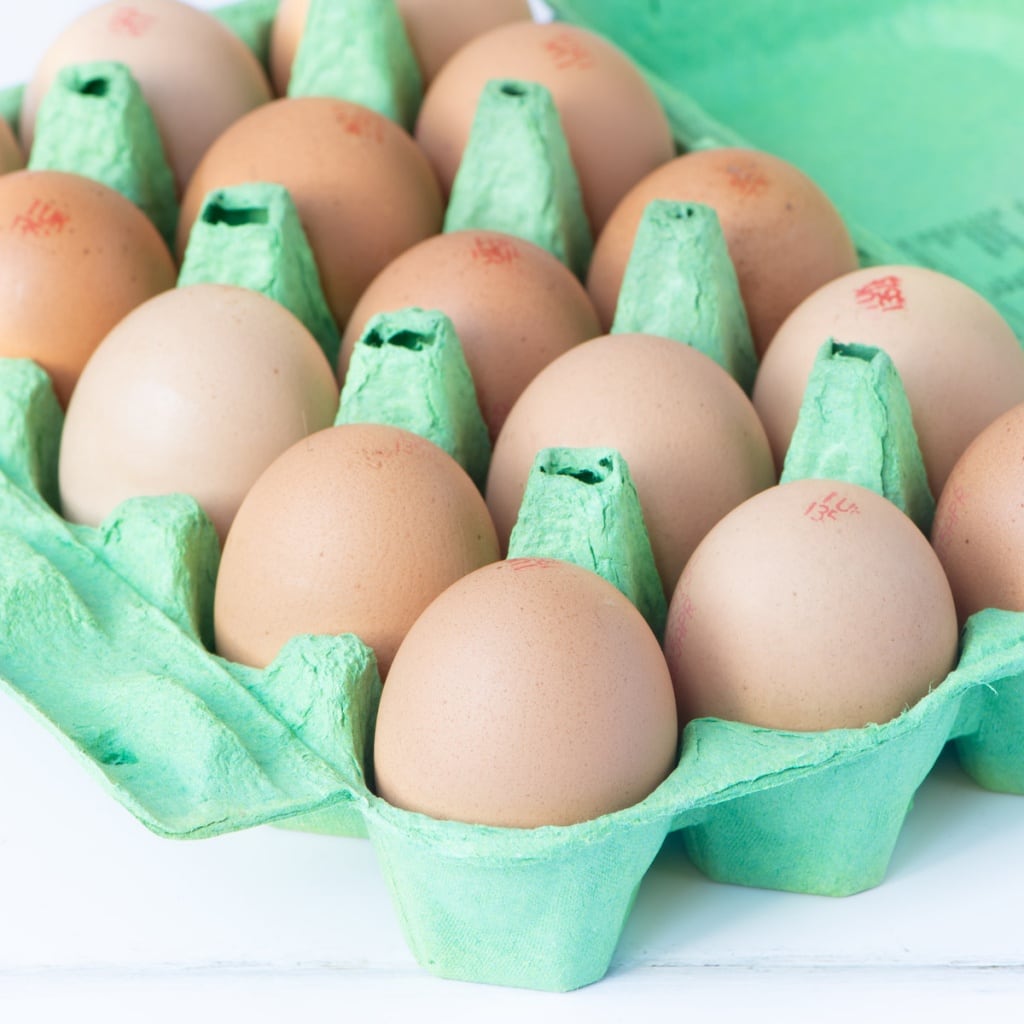 Jump to the question you’d like to answer…
Jump to the question you’d like to answer…Can I substitute medium eggs for large (or vice versa)?
How much do medium and large eggs, white and yolks weigh and how do you convert between them?
Can you bake with just eggs whites or yolks instead of whole eggs?
How do you convert between egg sizes for the EU, USA, Canada and Australia?
Can I Substitute Medium Eggs For Large (Or Vice Versa)?
One of my most popular recipes is my vanilla sponge cake and whenever I bake it I usually chuck in whatever eggs I happen to have in the kitchen whether medium or large and it’s always turned out just fine. I found it strange given that people are always saying how important accuracy is in baking that I could use pretty much any size of egg with good results. However, I’d never baked a medium-egg cake and a large-egg cake at the same time to compare the differences, so I decided to do just that. I made a batch of vanilla cupcakes using the smallest medium eggs and the largest large eggs and this is what I found (cupcakes are great for this type of experiment as I can bake small batches and they’re easy to compare side-by-side).The Results
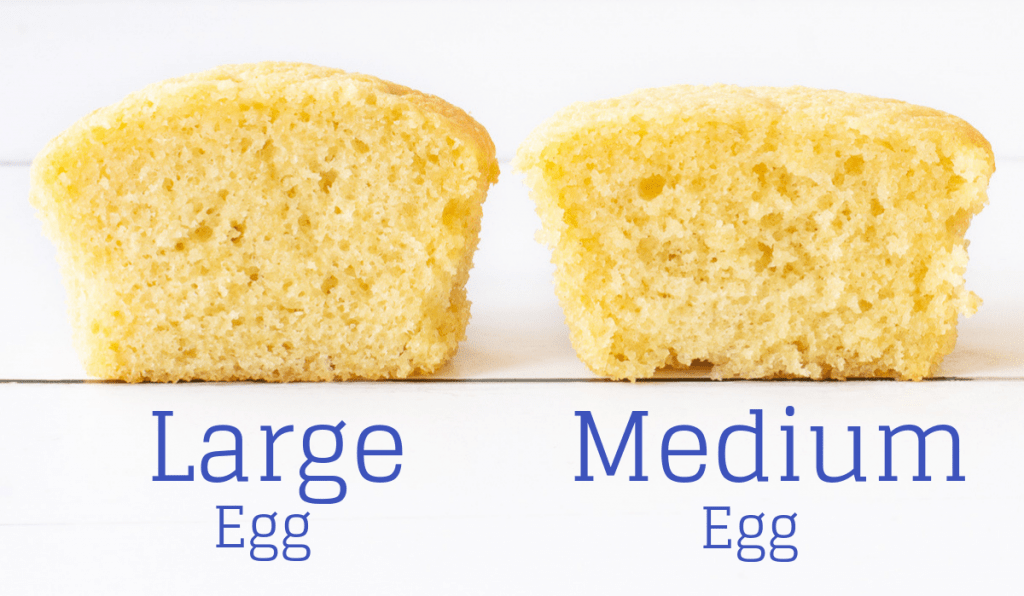 I preferred the cake made using medium eggs. It had a softer, fluffier and moister texture. However, on the negative side, it didn’t rise as much as the cake made using large eggs and it was more crumbly.
I preferred the cake made using medium eggs. It had a softer, fluffier and moister texture. However, on the negative side, it didn’t rise as much as the cake made using large eggs and it was more crumbly.Conclusion
If you make a cake with the wrong size eggs it’s unlikely to be a disaster, but if you want the taste and texture to be as intended when the recipe was written then stick to the right size of eggs as it does make quite a big difference.But what if I only have medium eggs and the recipe calls for large?
Then the best thing to do is to weigh your eggs. After discovering the difference it makes using medium v large eggs in a cake I got my scales out and weighed every egg I used in the kitchen for months (yes, that’s right I’ve been planning this post for a long time!). Not only did I weigh the egg in its shell, but I also weighed the white, yolk and both together. The table below shows the weight of egg needed for the number of medium/large eggs called for in a recipe. As a quick rule:6 large eggs = 7 medium eggs
If a recipe calls for medium eggs and you only have large
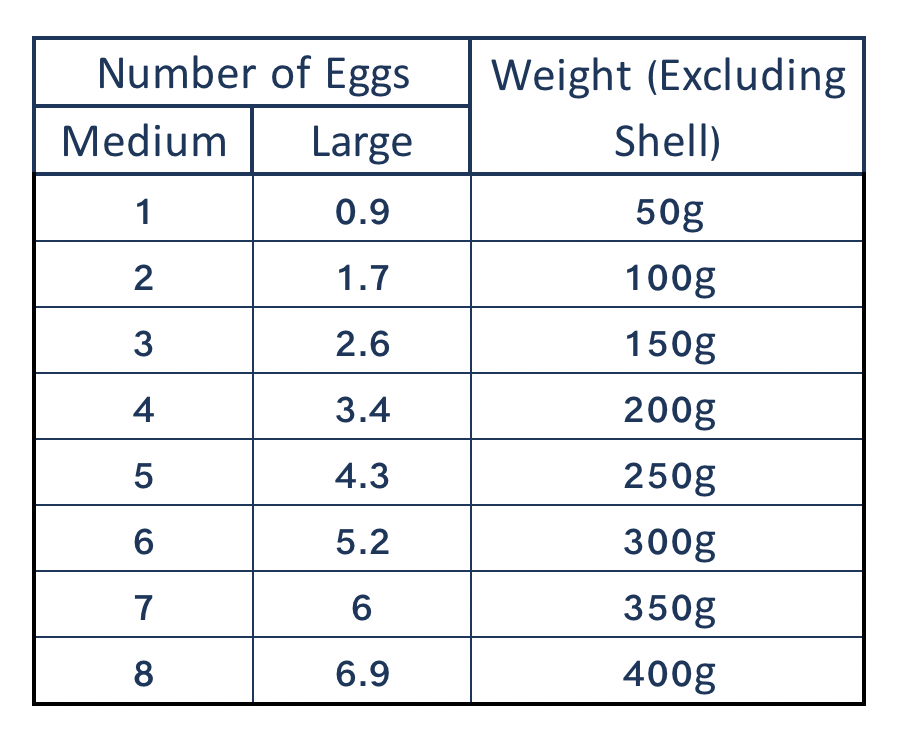
If a recipe calls for large eggs and you only have medium
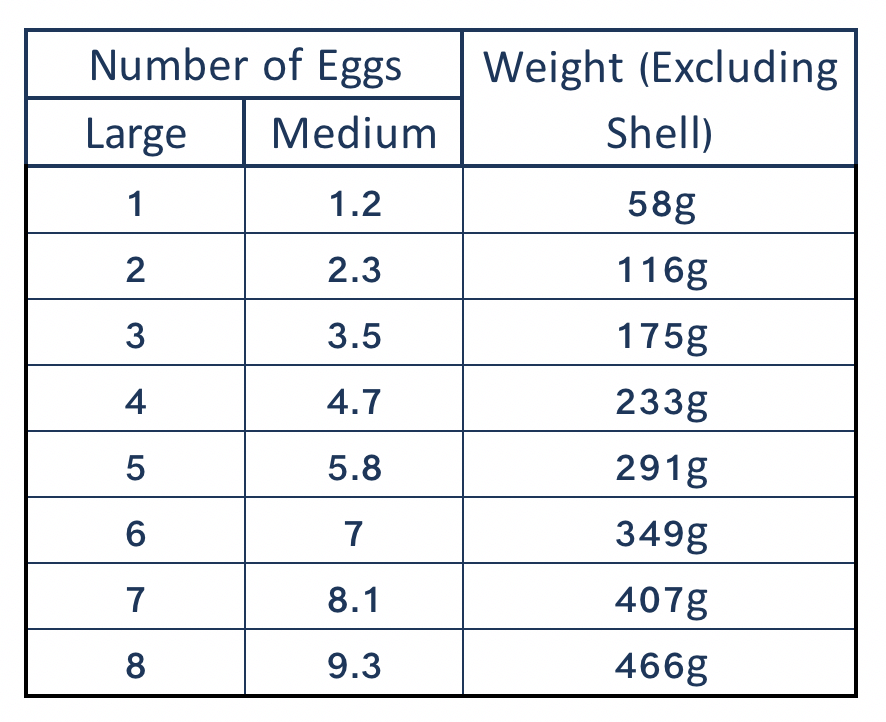 As I mentioned before, as well as weighing the whole egg I also weighed the whites and yolks separately and I was surprised by the results. I’d expected large eggs to have bigger yolks and whites, but in reality, the size of egg yolks barely varies by egg size, with the large yolks weighing the same as medium when rounding to the nearest whole gram.
As I mentioned before, as well as weighing the whole egg I also weighed the whites and yolks separately and I was surprised by the results. I’d expected large eggs to have bigger yolks and whites, but in reality, the size of egg yolks barely varies by egg size, with the large yolks weighing the same as medium when rounding to the nearest whole gram.1 medium egg yolk = 1 large egg yolk = 18g
If a recipe calls for a medium egg yolk and you only have large (or vice versa) then just add it in. It won’t make a difference. What this means is that pretty much all the size difference between medium and large eggs is in the whites. The tables below show the conversion between medium and large egg whites. As a quick rule:11 large egg whites = 13 medium egg whites
When a recipe calls for medium egg whites and you only have large
When a recipe calls for large egg whites and you only have medium
Can you bake with just egg whites or yolks instead of whole eggs?
All this thinking about eggs got me wondering. If your eggs are more white than yolk or vice versa will the effect the cake. To test the difference yolks and whites make to a cake I baked two more batches of cupcakes. One where I used all egg whites (increasing the number so the weight of egg in the recipe matched the weight if I were using whole medium eggs) and one where I used only egg yolks. The results surprised me.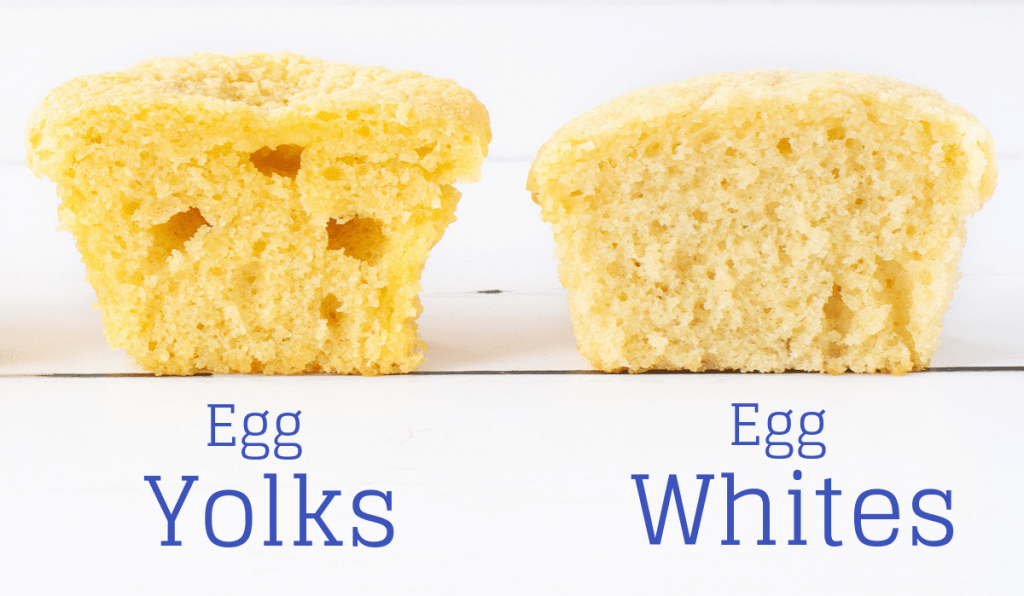 I had expected that the cake made with egg whites would be taller and fluffier as egg whites whip up so much and can hold a lot of air. The opposite was true. The yolk cake was by far the tallest. It also tasted best and had a lovely texture. However, you’ll see in the picture that it lacked structure with large air bubbles and a noticeable dip in the middle where it collapsed a little after baking. The cake made with just egg whites had a much more uniform structure suggesting it’s the eggs whites that act as cake “glue” far more than the yolks. It was paler in colour (as expected) and sadly tasted quite bland, unlike the egg yolk cake which was full of flavour, almost like a custard.
I had expected that the cake made with egg whites would be taller and fluffier as egg whites whip up so much and can hold a lot of air. The opposite was true. The yolk cake was by far the tallest. It also tasted best and had a lovely texture. However, you’ll see in the picture that it lacked structure with large air bubbles and a noticeable dip in the middle where it collapsed a little after baking. The cake made with just egg whites had a much more uniform structure suggesting it’s the eggs whites that act as cake “glue” far more than the yolks. It was paler in colour (as expected) and sadly tasted quite bland, unlike the egg yolk cake which was full of flavour, almost like a custard. When is a large egg not a large egg?
The answer depends on where in the world you are. Everything I’ve written here about egg sizes is true for the UK (and the rest of the EU as eggs are categorised consistently across EU countries). Unfortunately the same cannot be said for the rest of the world. This means that if you’re in the UK using an American recipe which calls for large eggs then you’d be better off using medium, or if you’re in Australia using a British recipe calling for large eggs then you should opt for Jumbo eggs. I recently wrote a long post about how to convert between grams, millilitres, US cups and ounces, but it turns out you need to covert your eggs too. The table below shows the size classifications for the UK (and the rest of the EU), USA, Canada and Australia. I chose those four countries as that’s where I know most of my readers are, but if you have a quick Google you can find the egg sizes by weight for most countries around the world.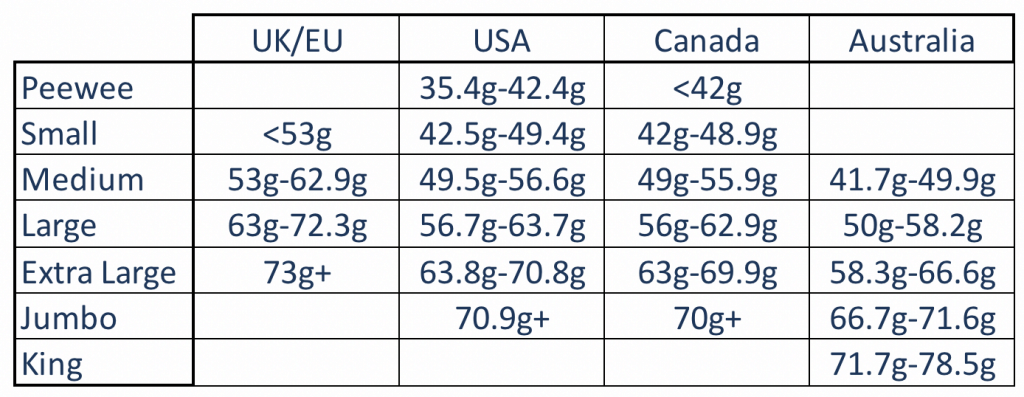 So if a recipe from another country calls for large eggs what size should you be using?
So if a recipe from another country calls for large eggs what size should you be using?  This table is a guide. As egg sizes don’t overlap perfectly you’d be best weighing your egg before adding it to the recipe, but using the sizes in the table as a substitute for large eggs should give decent results.
This table is a guide. As egg sizes don’t overlap perfectly you’d be best weighing your egg before adding it to the recipe, but using the sizes in the table as a substitute for large eggs should give decent results. 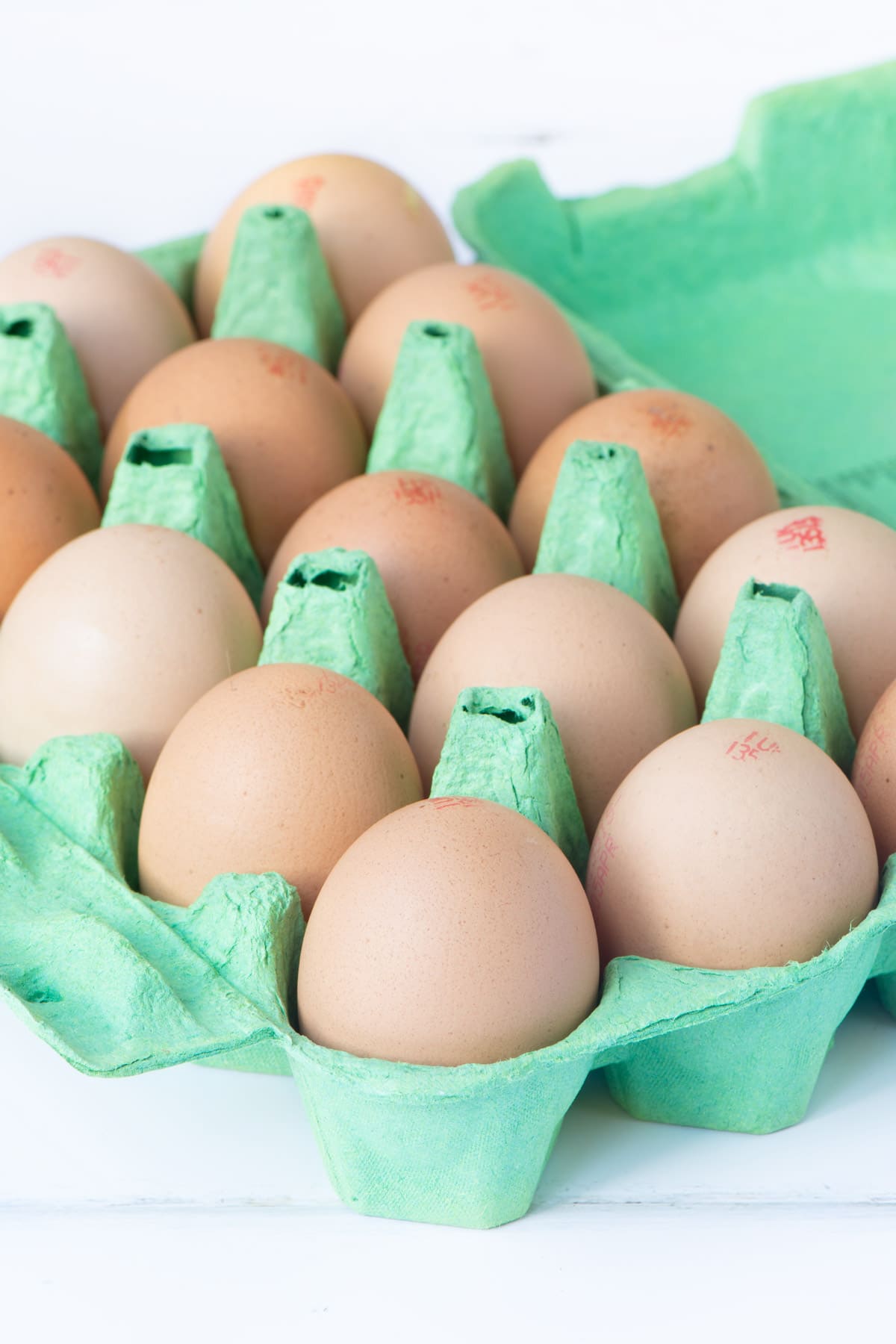 So there you have it, this is all I know about the impact of eggs in baking cakes. I hope it answers some of your questions and helps you to bake better cakes. If you have any other random egg related questions you’d like me to investigate then do let me know in the comments.
So there you have it, this is all I know about the impact of eggs in baking cakes. I hope it answers some of your questions and helps you to bake better cakes. If you have any other random egg related questions you’d like me to investigate then do let me know in the comments.FREE GRAMS TO CUPS CONVERSION CHARTS
Subscribe to the Charlotte’s Lively Kitchen mailing list to get your FREE printable grams to cups and cups to grams conversion charts for twelve popular baking ingredients
Pin This Egg Size Guide
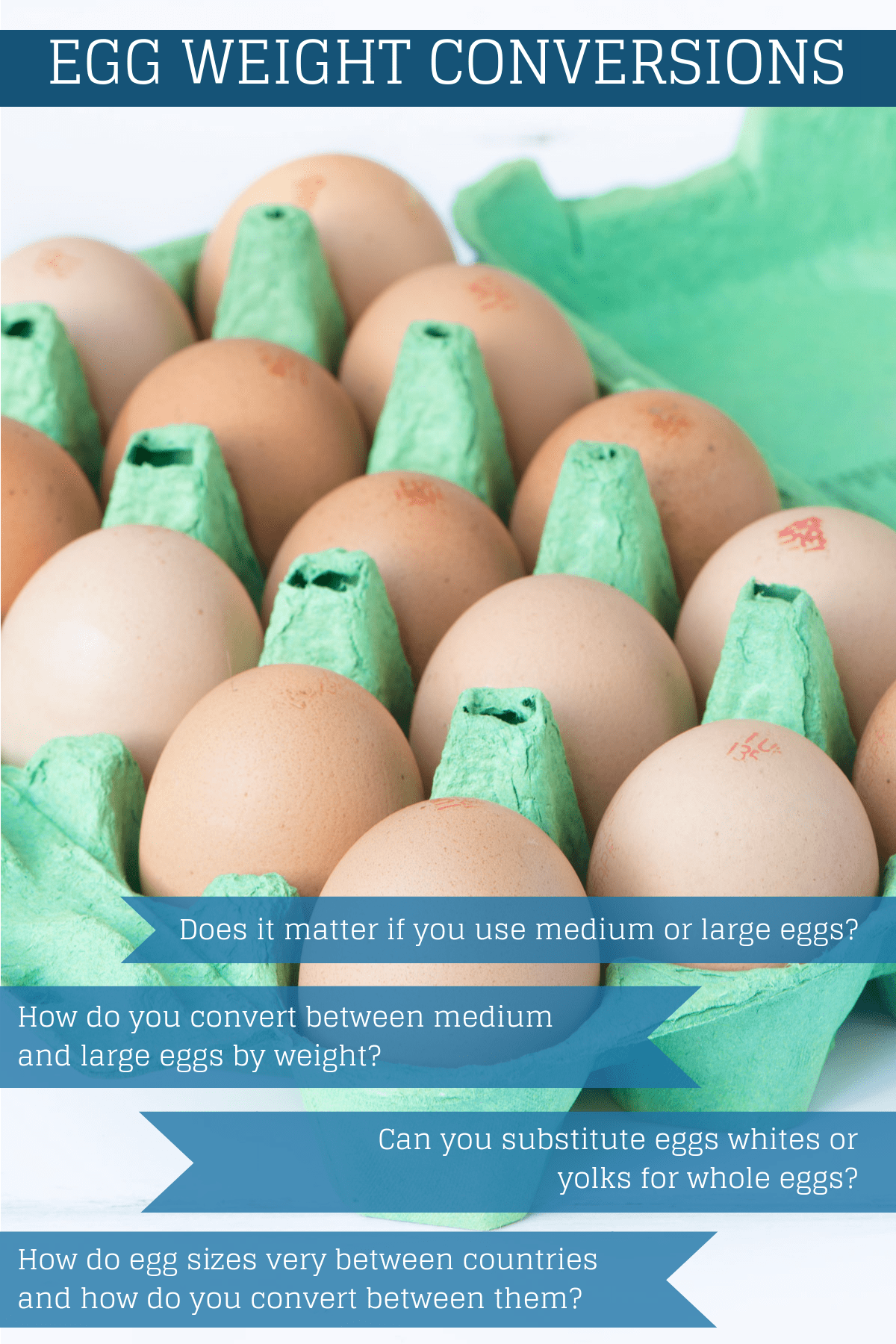


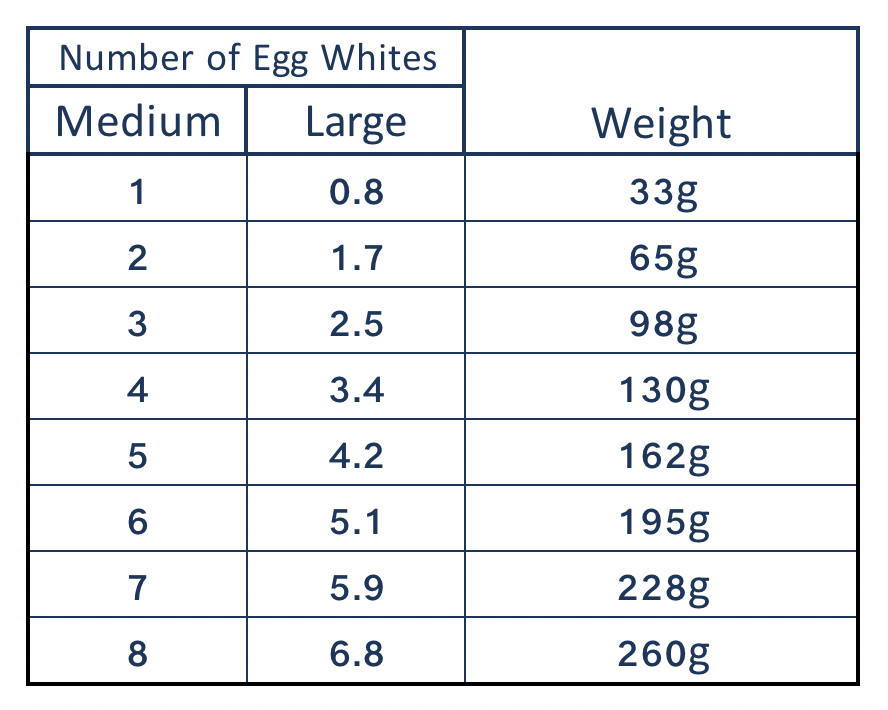
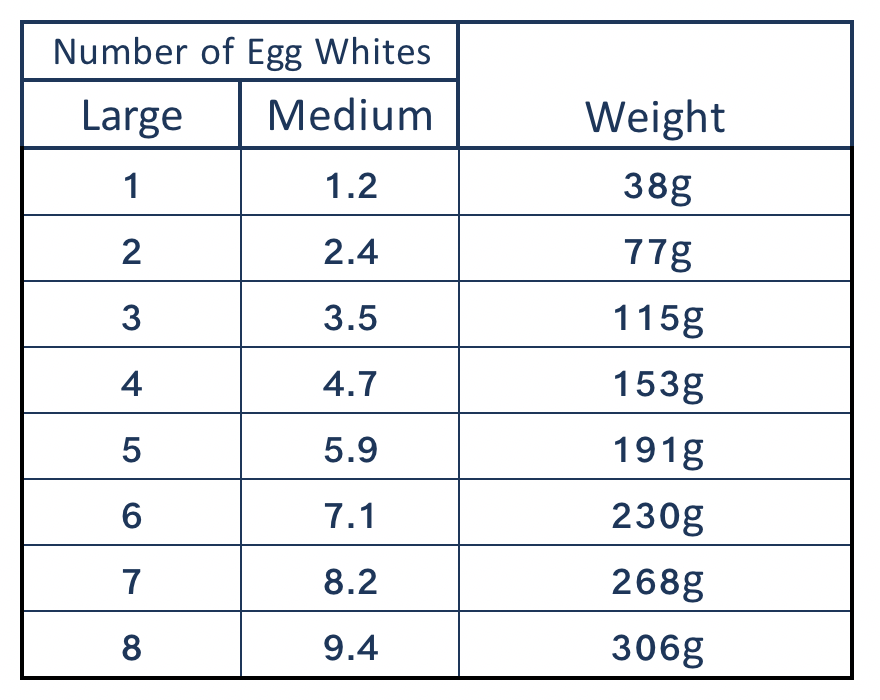
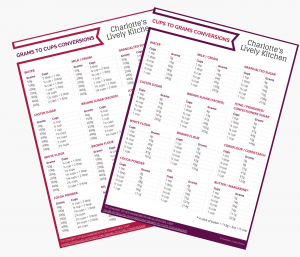
Jill says
Thank you for this post. You’ve saved me doing this research myself (same goes for your baking powder experiments). I sometimes buy boxes of mixed weight eggs, and having the confidence to sub in different sizes by weight will be really useful. Great info!
Amelia says
Great blog! Where I live (South Africa) our egg NET weights are as follows:
Jumbo: More than 66g
Extra Large: 59g – 66g
Large: 51g – 59g
Medium: 43g – 51g
Small: 33g – 43g
I usually grab ‘Large’ – and I’ve weighed them whole (without shell) fairly often. They have been anything between 46-50g each. I mostly get approx. 47g. I’ve used them for both US and UK recipes and they usually work out fine. I’ve done some googling and the general consensus seems to be that an eggshell is about 11% of the weight of the whole, so that’s in the ballpark. Just a little bit of trivia.
Jaden Kohen says
I have a cake recipe from [Nailed It!] Mexico that I translated and converted, which is what brought me to your site. My gram scale is packed in moving boxes about 1000 km away right now, but I am CRAVING THIS CAKE! Unfortunately it just says “two eggs” most USA recipes (where I am) presume large eggs, but do you care to wager a guess about the volume, weight, or size equivalent of the “two eggs” in this Mexican cake recipe? It’s a modern recipe if that helps….
I am allergic to eggs so I use a liquid egg replacement that is 3 US Tablespoons for each large egg in a recipe, I think that comes out to about 45 mL/”egg,” but I’ve never used my larger mL measuring cup to check; it’s extremely dense so the weight would be far off, but the brand is Just Egg
Charlotte Oates says
My guess would be that if they don’t specify, then it’s not a huge problem if you use slightly larger or smaller eggs. Given the size of a US large egg I’d say that’s a reasonable size to aim for. I hope it works OK for you.
Varsha says
Hi Charlotte,
I bake your birthday vanilla sponge all the time and it comes out great. I’ve recently bought new Fat Daddios pans and since then the sponge is just too dry! I’ve adjusted the temp down to 135 degrees as this is what they suggest (their pans conduct heat better so lower temp needed). The chocolate sponge from your recipes comes out perfect! Just the vanilla sponge is all crumbly and falling apart. Any ideas?
Charlotte Oates says
I’ve not used those tins so I can’t be 100% sure. If the sponge is dry it sounds as though they’re still over-baked so either needs a greater reduction in temperature, or a shorter baking time. Is there a reason you can’t just use the old tin that the sponge worked well in?
Varsha says
I’ve worked it out! I used large eggs today instead of medium and it came out absolutely perfect.
My old tins were just cheap supermarket ones, and the side of the sponge would always be slanted so looks weird when decorated.
New tins are brilliant, no trimming needed and super straight edges!
Varsha says
Love all your recipes Charlotte. Only thing missing is a red velvet sponge recipe
Jaden Kohen says
If really like to see a red velvet cake record too! It’s a fav of mine! True red velvet though, not just chocolate dyed red there’s a difference in the cocoa powder, and it’s super hard to find here in the states, but I have sources overseas of I have the right recipe!
Craig Stroker says
This is great information. Thank you. Good to know using UK recipes.
I’m in Florida, USA. Getting interested in recipes from over seas.
Carol says
Thank you! Most of my recipes are from the USA, but I’m in Scotland., I’m experimenting with bread baking (as one does) during the lockdown, and I’m trying to use ingredient weights instead of volumes. This is a very helpful post.
Mitch says
Thanks for the helpful information! I wanted to know which size eggs have the best protein to fat ratio. Since Lg eggs have more “white”, but the same “yolk” by weight vs Med eggs this is a good indicator that Lg eggs have the best ratio. I realize there could be other factors involved before I can reach a definitive conclusion, but I’m off to a great start. I hope you had fun doing this science experiment!
Kadir says
Thanks…
Desiré says
Try quail eggs for baking. They have more yolk and the result is a very creamy cake. I substitute eggs by weight.
Anje says
Hi please could you do a conversion for small eggs please. This post was really useful but missed off small eggs. Many thanks for all your hard work and gorgeous recipes.
Charlotte Oates says
Unfortunately not as they’re not something I tend to find in the supermarkets so I can’t get hold of them to weigh them. I’ll keep an eye out to see if I spot any, but it’ll take a while for me to find enough to collect all the data I’d need.
Karen Weston says
Hi Charlotte, I am spending some Corona Virus lockdown time researching what different ingredients do in cakes, as I have had some problems with my cake recipe inventions recently. This research has been super helpful and I now have a much greater understanding of why my cakes were either too wet, dry, flat or dense. Thank you so much!!
Grace says
Thank you for this, such a useful post, I had no idea what the difference was before now! Loved seeing you on TV too, you did such a great job!
Yvonne says
Very helpful. Thank you for taking the time and making the effort to help. Very much appreciated
Ejay says
Thanks so much for this. I recently followed meringue making instructions , which specified double caster sugar to egg white weight. I had noticed my eggs this week had a lot more egg white than the ones I had used last week, and sure enough weighing showed we needed an extra 50 g of sugar. My meringues were perfect, normally I get some sugar weeping. I also had the wrong size eggs for cupcake recipe, and added an extra one as I normally would do, but the large egg white ratio definitely had an effect on our cakes, we had souffles ! So I really wanted to see if I could get egg weight measurements and everywhere else I looked has only suggested adding extra medium eggs in place of large when using either 3 or 4 and more, so no agreement between different websites. Your research is just what I need, and will save me a lot of time and money doing it myself. Thanks !
Matt Whyndham says
Should pernickity bakers be adjusting the dry ingredients, e.g. flour, to match the eggs they have, or is that taking things too far?
So a recipe might say 200 g flour, 3 large eggs. I have 3 medium eggs, so that’s 171 g (multiplying by 6/7), to get the same consistency as the author of the recipe.
Charlotte Oates says
It depends on the recipe, chances are you’ll get a perfectly edible cake either way, but as you can see from my results switching large for medium eggs can have quite a big impact on the texture of a cake and I suspect if a cake has been designed to be made with large eggs and you use the same number of medium then you could end up with a cake that’s too crumbly.
I’d probably weigh the eggs and add part of a 4th egg to the mix instead of reducing down the other ingredients as having less mixture in a tin may impact cooking times. Alternatively, as you suggest, you could reduce down all of the other ingredients.
Ben Artzi says
What wonderful dedication to experimentation and learning! Do you still have the spreadsheet of all the individual eggs you measured? It would be interesting to see the distribution, and also see the white-to-yolk ratios that all your eggs had.
Charlotte Oates says
I do, I thought about sharing all of the distribution graphs but I realised I was in danger of making the post far too technical.
Punam Paul says
Very good experiment and well explained article with images.
Removed confusion of many including me.
Fran says
What if the recipe doesn’t state a size?
Charlotte Oates says
Best thing to do would be to comment (if you can) asking the correct size to use. If it’s a BBC good food recipe then they usually use large in theirs unless otherwise stated. If you can’t ask then I’d weight my eggs and aim for ones that are on the larger size of medium or the smaller side of large.
Wendy Johnson says
Hi Charlotte
I’ve been baking for too many years to remember 40 +years & counting. Around 15 years ago I started to buy my eggs from a friend who had a small holding but the eggs varied in size dramatically as sometimes they were chicken eggs sometimes duck or even turkey eggs so I started to weigh my eggs, so for a 6oz mix flour sugar & butter I would weigh out 6oz of eggs I sometimes add a little milk to make up the weight too & this works well & cakes turn out perfect every time, so I Would agree wholeheartedly that size does matter, & thank you for sharing all your wonderful recipes & ideas I love your site & you’re never too old too learn. Keep up the good work.
Wendy.
Desiré says
Isn’t that the way a victoria sponge works? Weigh eggs and add same quantity of flour etc. I’ve always done it that way and had lovely cakes no matter what eggs I used (quail and proper butter were to die for!).
Mary Dobson says
Thanks for the hard work Charlotte.
I never thought it mattered to much between the sizing of eggs between medium & large,
But i can see now how wrong I was..
Mrs Natalie Dawn says
This is great thank you for taking the time to experiment and reporting back x
Chloe Edges says
This is genius!